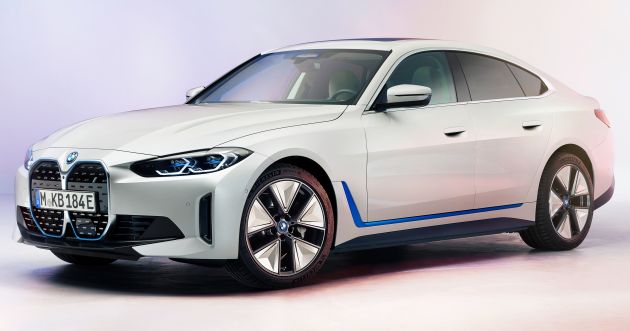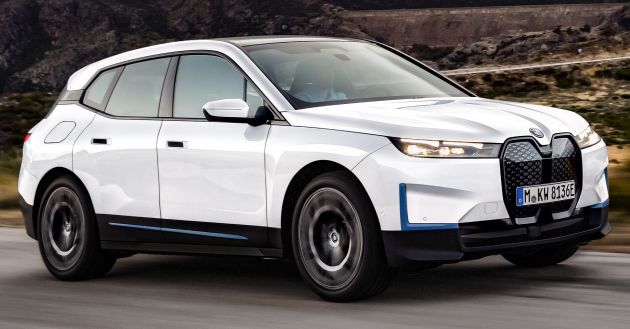BMW Group reveals its future roadmap until 2025 and beyond – next-generation “Neue Klasse” EVs planned
It was a busy time for the BMW Group during the company’s annual conference this year, with the i4 making its first official debut ahead of a market launch later this year. Aside from introducing the all-electric sedan, the company also talked about its future plans, with Oliver Zipse chairman of the board of management of BMW Group, on hand to discuss the details.
In his speech, Zipse laid out BMW Group’s roadmap for 2021, 2023 and 2025, with specific goals that the company intends to meet. For this year, the company is expecting xEV (battery-electric and plug-in hybrid electric vehicles) sales to grow by more than 75% compared to 2020.
Additionally, it aims to increase the percentage of fully-electric vehicle sales by more than double compared to the year before. By the end of 2021, the company says deliveries of electrified vehicles could exceed more than one million units since 2013.
By 2023, BMW will have 13 EV models covering all key segments from compact to the ultra-luxury class. The company adds that by the end of Phase II of its transformation, all major series models will have a fully-electric offering, covering about 90% of its segments. “I want to make it quite clear: If demand in certain markets shifts entirely to fully-electric vehicles within the next few years – we will be able to deliver,” said Zipse.
Moving forward to 2025, the German automaker hopes to deliver around two million EVs to customers, with a 50% increase in sales over the next few years – more than ten times the figure for 2020. All-electric versions of the 5 Series and X1 will be introduced to support this plan, together with other models such as the BMW 7 Series and the successor to the MINI Countryman.
The MINI brand will be the first BMW Group subsidiary to go fully electric by the early 2030s, with the final model with a combustion-engine variant set to be released in 2025. Meanwhile, Rolls-Royce will also come up with EV products.
Beyond EVs, the company is also looking towards e-fuels as well as hydrogen, the latter of which will see a small series of the i Hydrogen NEXT being released, with the possibility of a production vehicle being developed.
Zipse also talked about a radically new product offering, which is being referred to as “Die Neue Klasse,” or “the new class” when translated. The term should be familiar to BMW fans, as it refers to a line of models produced by the brand that helped ensure its solvency around five decades ago.
Part of the company’s Phase III of transformation that will take effect from 2025 onwards, it features three key aspects: a completely redefined IT and software architecture, a new generation of high-performance electric drivetrains and batteries, as well as a new approach to sustainability.
“The BMW Group is never satisfied with what it has achieved so far – that’s what sets it apart from the rest of the field. This spirit will characterise the Neue Klasse: high tech on four wheels for customers intent on experiencing in just five years’ time how mobility will feel in 2030,” said Zipse.
Modularity will be an important part of this strategy, with a brand-new architecture that can cater to different target groups, from high-volume series through to high-performance M models. The company also wants to ensure its electric drivetrains and battery packs are well integrated in order match the range and manufacturing cost of its combustion engines.
Other focal points include highly automated driving systems to complement the typical BMW driving experience, integrated digital ecosystems, aerodynamic-optimised designs and more spacious interiors.
The production of these vehicles also take into consideration the scarcity of finite resources, and will see the increased use of secondary materials like recycled steel, plastic or aluminium in the interest of sustainability. “We are intent on ensuring that the ‘greenest’ electric car on the market is made by BMW,” said Zipse. This initiative will also see recycling being taken into account right from the vehicle design stage, ensuring “discarded” BMWs still can contribute after their lifespan ends.
It’s clear that EVs are BMW’s priority moving forward, with combustion-powered vehicles set to be on the decline. The group expect the number of EVs delivered to continue growing by an average of over 20% annually between 2025 and 2030, with such vehicles accounting for at least 50% of deliveries by the latter year. This strong focus will see around ten million BMW Group EVs on roads worldwide over the next ten years or so.
The post BMW Group reveals its future roadmap until 2025 and beyond – next-generation “Neue Klasse” EVs planned appeared first on Paul Tan's Automotive News.
from Paul Tan's Automotive News
Read The Rest:paultan...






Post a Comment